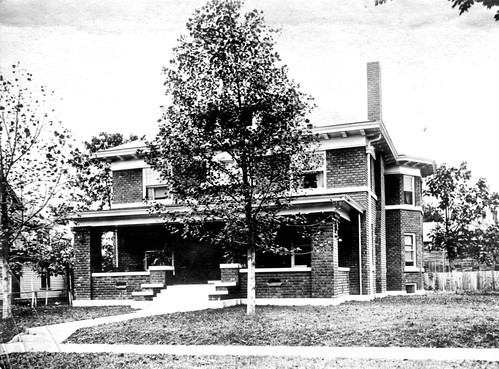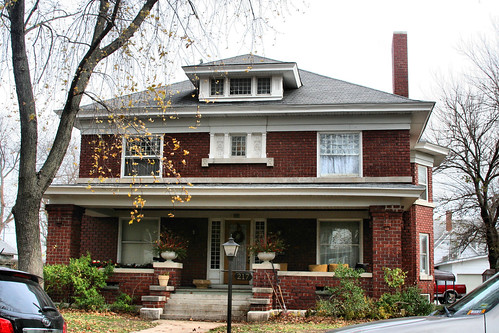The next item in the portfolio of Garstang & Rea is the Arthur Spencer House in Joplin, located today at 217 N. Pearl Ave. The Centennial History of Missouri by Walter Barlow Stevens, has this short biography of Mr. Spencer:
Among the list of distinguished lawyers who have graced the bar of Missouri in general and of Joplin, Jasper county, in particular, the name of A. E. Spencer deserves a prominent place, not alone because of his legal ability but for his probity of character and his worth as a citizen. Mr. Spencer was born in Newburg, Indiana, October 3, 1868, a son of Galen and Mary M. (Bates) Spencer, the former a native of Illinois and the latter of Indiana. They were married in Boonville, Indiana, and continued to reside there up to 1873 when they moved to Joplin, Missouri. Galen Spencer, while yet a young man, applied himself to the study of the law, and some time later was admitted to the Indiana state bar, continuing to practice in that state up to the time of his removal to Joplin.
Here he resumed his legal practice and in due course came to be recognized as one of Joplin’s foremost attorneys, at the same time earning a reputation throughout Missouri as one of the state’s ablest barristers and most forceful advocates. His death, which occurred December 30, 1904, was the occasion for deep felt sorrow among his legal brethren and the citizens at large, to whom he had endeared himself by his upright character and conduct during the many years of his residence in this city. His widow is still living in the old home in Joplin, where she is spending the evening of her life among a large circle of friends who regard her with affection.
A. E. Spencer, the subject of this sketch, was educated in the St. Louis Law School, a department of the Washington University, from which institution he received his degree of LL. B., graduating with the class of 1888. Following his graduation he associated himself with his father in the practice of his profession at Joplin, and this mutually agreeable partnership continued up to the time of the death of his father in December, 1904. Since then his brother, C. C. Spencer, has been associated with him in his legal practice, the firm enjoying an extensive and influential clientele, Mr. Spencer’s standing in legal circles making his services much in demand. Mr. Spencer is a director of the Joplin National Bank, to the duties of which office he brings sound and thoughtful judgment.
On November 13, 1898, Mr. Spencer was united in marriage to Miss Lou Ann Howard, of Webb City, Missouri, and to this union two children have been born, one son, Arthur E., Jr.. surviving. Mr. and Mrs. Spencer are members of the Congregational church and interested in its good works, as they are in all social and cultural activities, and in all movements having for their object the wellbeing of the community. During the participation of this country in the great World war Mr. Spencer was called upon to serve as a member of the legal advisory board, carrying out the duties imposed on him with zeal and fidelity. In fraternal circles he is a life member of Joplin Lodge, No. 501, Benevolent and Protective Order of Elks.
Additionally, Spencer was the legal counsel for the Joplin National Bank, Empire District Electric Company, Eagle-Picher Lead Co., Empire Zinc Co., and the Missouri Pacific Railroad Company. When not dazzling his peers in the courtroom, Spencer was one of a group of Joplinites who decided to bicycle across a number of states in 1896, which we wrote about earlier (click here for a photograph of Mr. Spencer with his comrades in cycling).
In last good news, Spencer’s home as it remains since the last Google Maps car passed through:



